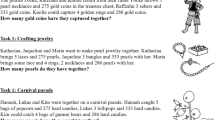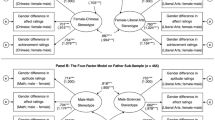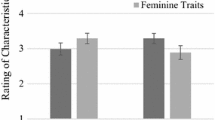Abstract
This study analyzes the hypothesized biasing effect of teachers' gender stereotypes on their impressions of their students' competence and effort in mathematics. 48 teachers participated in the study and responded to the questionnaires concerning perceptions of about 300 of their third and fourth grade students. In general, teacher perceptions were consistent with stereotypes of gender differences: Boys have more developmental resources in mathematics. Furthermore, this bias in teacher perceptions of their students' resources in math is linked to the teacher's own category — based, gender role stereotypic beliefs regarding the general distribution of math talent between boys and girls. The finding is moderated by the student's performance level: It only holds for average and low achieving but not for high achieving boys and girls. In this way, students' performance level is an essential mediator-variable in the transmission of teachers' gender stereotypes.
Similar content being viewed by others
REFERENCES
Aronson, E.: 1994, Sozialpsychologie. Heidelberg: Spektrum.
Bailey, S.M.: 1993, 'The current status of gender equity in American school', Educational Psychologist 28, 321–339.
Best, D.L. and Williams, J.E.: 1993, 'A cross-cultural viewpoint', in A.E. Beall and R.J. Sternberg (eds.), The Psychology of Gender, Guilford Press, New York, pp. 215–248.
Brady, K.L. and Eisler, R.M.: 1999, 'Sex and gender in college classrooms: A Quantitative Analysis of faculty-student interactions and perceptions', Journal of Educational Psychology 91, 127–145.
Campbell, D.T.: 1967, 'Stereotypes and the perception of group differences', American Psychologist 22, 817–829.
Eagly, A.H. and Steffen, V.: 2000, 'Gender stereotypes stem from the distribution of women and men into roles', in C. Stangor (ed.), Stereotypes and Prejudice, Psychology Press/Taylor and Francis, Philadelphia, pp. 142–160.
Eccles, J.: 1993, 'School and family effects on the ontogeny of children's interests, self perceptions, and activity choice', in J.E. Jacobs (ed.), Nebraska Symposium on Motivation, University of Nebraska Press, Lincoln, pp. 145–218.
Fennema, E., Peterson, P., Carpenter, T.R. and Lubinski, C.A.: 1990, 'Teachers' attributions and beliefs about girls, boys, and mathematics', Educational Studies in Mathematics 21, 55–69.
Fennema, E. and Hart, L.: 1994, 'Gender and the JRME', Journal for Research in Mathematics Education 25, 648–659.
Gibbons, J.L.: 2000, 'Gender development in cross-cultural perspective', in T. Eckes and H.M. Trautner (eds.), The Developmental Social Psychology of Gender, Lawrence Erlbaum Ass., Mahwah, pp. 389–415.
Grevholm, B. and Hanna, G. (eds.): 1995, Gender and Mathematics Education, An ICMI Study, Lund University press, Lund/Sweden.
Hosoda, M. and Stone, D.: 2000, 'Current gender stereotypes and their evaluative context', Perceptual and Motor Skills 90, 1283–1294.
Jacobs, J.E.: 1991, 'Influence of gender stereotypes on parent and child mathematics attitudes', Journal of Educational Psychology 83, 518–527.
Johnson, S.: 1996, 'The contribution of large-scale assessment programmes to research on gender differences', Educational Research and Evaluation 2, 25–49.
Jungwirth, H.: 1991, 'Die Dimension “Geschlecht” in den Interaktionen des Mathematikunterrichts', Journal für Mathematik 12, S. 133–170.
Leder, G.C.: 1992, 'Mathematics and gender: Changing perspectives', in D.A. Grouws (ed.), Handbook of Research in Mathematics Ecucation, Macmillan, New York, pp. 597–622.
Leder, G.C., Forgasz, H.J. and Solar, C.: 1996, 'Research and intervention programs in mathematics education: A gendered issue', in A. Bishop, K. Clements, C. Keitel, J. Kilpatrick and C. Laborde (eds.), International Handbook of Mathematics Education, Part 2, Kluwer, Dordrecht, pp. 932–961.
Pettigrew, T.F.: 1979, 'The ultimate attribution error: Extending Allport's cognitive analysis of prejudice', Personality and Social Psychology Bulletin 5, 461–476.
Sadker, M., Sadker, D. and Klein, S.: 1991, 'The issue of gender in elementary and secondary education', Review of Research in Education 17, 269–334.
Secada, G.W., Fennema, L.B. and Adajian, L.B. (eds.): 1995, New Directions for Equity in Mathematics Education, Cambridge University Press, Cambridge.
Stipek, D.J. and Gralinski, J.H.: 1991, 'Gender differences in children's achievement related beliefs and emotional responses to success and failure in mathematics', Journal of Educational Psychology 83, 361–371.
Tiedemann, J.: 2000a, 'Gender-related beliefs of teachers in elementary school mathematics', Educational Studies in Mathematics 41, 191–207.
Tiedemann, J.: 2000b, 'Parents' gender stereotypes and teachers' beliefs as predictors of children's concept of their mathematical ability in elementary school', Journal of Educational Psychology 92, 144–151.
Tiedemann, J. and Faber, G.: 1995, 'Mädchen im Mathematikunterricht: Selbstkonzept und Kausalattributionen im Grundschulalter', Zeitschrift für Entwicklungspsychologie und Pädagogische Psychologie 27, 61–71.
Tiedemann, J. and Faber, G.: 1994a, 'Mädchen und Grundschulmathematik: Ergebnisse einer vierjährigen Längsschnittuntersuchung zu ausgewählten geschlechtsbezogenen Unterschieden in der Leistungsentwicklung', Zeitschrift für Entwicklungspsychologie und Pädagogische Psychologie 26, 101–111.
Tiedemann, J. and Faber, G.: 1994b, 'Ist Mathe nichts für Mädchen? Mädchen unterschätzen sich im Mathematikunterricht', Die Grundschulzeitschrift 74, 33–35.
Walkerdine, V.: 1997, 'Feminity as performance', in M.M. Gergen (ed.), Toward a New Psychology of Gender, US Taylor and Francis/Routledge, Florence, KY.
Walkerdine, V.: 1998, Counting Girls Out: Girls and Mathematics, Virago, London.
Weiner, B.: 1992, Human Motivation: Metaphors, Theories, and Research, Sage, Newbury Park, CA.
Wigfield, A., Eccles, J.S., Yoon, Kwang Suk, Harold, R.D., Arbreton, A.J., Freedman-Doan, C. and Blumenfeld, P.C.: 1997, 'Change in children's competence beliefs and subjective task values across the elementary school years: A 3-year study', Journal of Educational Psychology 89, 451–469.
Zemore, S.E., Fiske, S.T. and Kim, H.J.: 2000, 'Gender stereotypes and the dynamics of social interaction', in T. Eckes and H.M. Trautner (eds.), The Developmental Social Psychology of Gender, Lawrence Erlbaum associates, Mahwah, pp. 207–241.
Author information
Authors and Affiliations
Rights and permissions
About this article
Cite this article
Tiedemann, J. Teachers' Gender Stereotypes as Determinants of Teacher Perceptions in Elementary School Mathematics. Educational Studies in Mathematics 50, 49–62 (2002). https://doi.org/10.1023/A:1020518104346
Issue Date:
DOI: https://doi.org/10.1023/A:1020518104346




